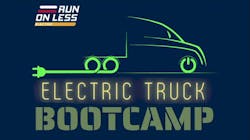Understanding electric vehicles with Run on Less Bootcamp
The team at NACFE is extremely excited about the upcoming Run on Less -Electric, but we are also equally excited about the upcoming Electric Truck Bootcamp. In case you have not heard about it, the boot camp is a series of 10 training sessions on various aspects of electric trucks. It is designed to increase awareness about electric trucks, provide professional development opportunities and gather key stakeholders across the electric truck ecosystem to discuss possibilities and challenges in the deployment of commercial battery-electric vehicles.
If you are like me, I bet you can’t remember the number of webinars, Zoom or Teams sessions you’ve attended since the pandemic began. I am guessing that in many cases while we sit in on lots of these webinars, we do not fully engage during them. Rather we act as spectators much like we do at a ballgame.
If we are going to advance the deployment of electric vehicles (EVs) in the trucking industry, all of us need to be better educated about the various aspects of EV deployment from why EVs to make sense in certain applications to understanding what is needed for an effective charging infrastructure to working with utilities to the available incentives for electrification to the maintenance, safety and training needs of both drivers and technicians. We also need to understand new business models for EVs and start to determine what are available options for batteries that are at the end of their useful life in vehicles.
These are many of the topics that will be covered in the 10-week boot camp training. I hope that many of you will sign up for the training not simply as spectators, but rather as active participants. What does that mean? I hope you take time to send in questions in advance of each boot camp session so that the panelists can tailor their presentations to best meet the needs of the audience. I also hope that you will talk about what you learn in the webinars with folks inside of your company as well as others outside your company.
I want you to consider attending all 10 training sessions, taking online quizzes after each training and earning digital badges that recognize your expertise. Badges are available for those who complete one, five, or 10 sessions via runonless.com. Participation in the quizzes and badging system is not required for participation in the Bootcamp trainings, but I believe they will enhance the experience. For bootcamp attendees.
If the electric truck ecosystem is going to scale we need the active expertise of as many people as possible. Think of this as not just attending a baseball game, but rather as reading up on the teams before you go to the game and filling in the box score during the game. Seems to me you get more out a baseball game when you actively engage with what is occurring on the field. I think the same will be true if you actively engage in our boot camp trainings. And best of all, at our Electric Truck Bootcamp there is no drill instructor yelling at — just practical information that will make you an EV expert.
Michael Roeth has worked in the commercial vehicle industry for nearly 30 years, most recently as executive director of the North American Council for Freight Efficiency. He currently serves on the second National Academy of Sciences Committee on Technologies and Approaches for Reducing the Fuel Consumption of Medium and Heavy-Duty Vehicles and has held various positions in engineering, quality, sales and plant management with Navistar and Behr/Cummins.
About the Author

Michael Roeth
Executive Director
Michael Roeth is the executive director of the North American Council for Freight Efficiency. He serves on the second National Academy of Sciences Committee on Technologies and Approaches for Reducing the Fuel Consumption of Medium and Heavy-Duty Vehicles and has held various positions with Navistar and Behr/Cummins.
